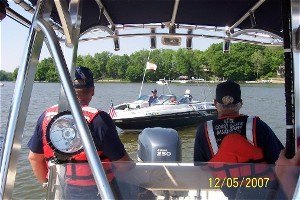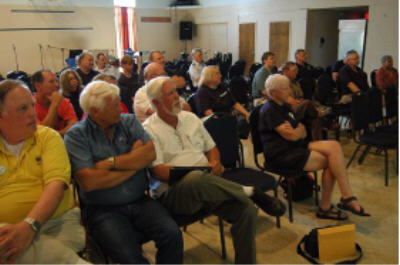Flotilla 1-7 Member Training
On-the-Water Training

Flotilla Underway Training
Flotilla 1-7 Operational Facilities conduct training during each and every patrol. Standard patrols can include training in towing, man overboard procedures, anchoring, navigation, small boat handling, emergency procedures, communications procedures and many other topics.
The Flotilla Staff Officers for Operations and Member Training conduct scenario based training throughout the year to build on the routine training conducted during weekly patrols.
Flotilla 1-7 Operational Facilities also take part in other on-the-water training planned and scheduled by the Division and Sector commands.
About the AUXOP Program

The AUXOP, or "Operational Auxiliarist" Program is an advanced training program available to members of the Coast Guard Auxiliary who wish to increase their practical relevance to Coast Guard missions, and better assist the Coast Guard to fulfill needed skill sets. Members who successfully complete their training are authorized to wear the prestigious AUXOP Device, shown here, and their membership level advances from Initially Qualified (IQ) or Basic Qualified (BQ) to Operational Auxiliarist (AX), or just "AUXOP".
The program has sometimes been called the "Ph.D of the Auxiliary", and members who attain AUXOP status should be justly proud of their accomplishment, increased utility to the Auxiliary and to the Coast Guard, and in their ability to serve as role models for their shipmates.
Qualification Requirements
In order to qualify as an Operational Auxiliarist, the member must successfully obtain a minimum of seven (7) credits from three categories of courses.
Each of the courses requires a proctored, closed-book final examination with a minimum passing grade of 75%. The program was dramatically revised effective January 1, 2011 from six (6) specific specialty courses to a much broader selection, as outlined below, that allow the Auxiliarist a much wider latitude in pursuing knowledge and skills in his or her areas of interest.
Course categories and requirements are as follows:
- Required core courses, worth one credit each (3 available, all are required);
- Leadership course, worth one credit (5 available; credit given only for one)
- Elective courses, credits as shown (numerous available)
Core Courses
The required core courses are as follows. Each is worth one (1) credit, and all are required:
- Auxiliary Weather Specialty Course (AUXWEA)
- Auxiliary Seamanship Specialty Course (AUXSEA)
- Auxiliary Communications Specialty Course (AUXCOM)
Although the curriculum for the AUXCOM course changed significantly in the fall of 2010, members who successfully completed the previous AUXCOM speciality by December 31, 2010, will meet the requirements.
Leadership Courses
Candidates will be required to complete one of the following leadership courses, worth one credit each. Regardless of the number of leadership courses taken, however, only one (1) credit will be applied to AUXOP qualification.
- Auxiliary Leadership and Management (AUXLAMS),
- Auxiliary Mid-Level Officers Course (AMLOC),
- Auxiliary District Captain Course,
- Flotilla Leadership Course (FLC),*
- Auxiliary Senior Officers Course (ASOC).
*The Flotilla Leadership Course (FLC) is available in both a classroom and an online version.
Elective Courses
- Auxiliarists will be required to complete their AUXOP credits by completing a combination of the following elective courses, totaling three (3) or more credits:
- Auxiliary Search Coordination and Execution Specialty Course (AUXSC&E) - 2 credits.
- Auxiliary Navigation Specialty Course (AUXNAV) - 2 credits.
- Introduction to Marine Safety - 2 credits.
- Auxiliary Patrol Specialty Course (AUXPAT) - 1 credit.
- Auxiliary Aids-to-Navigation (ATON) and Chart Updating C-school (AUX-06) - 1 credit.
- Coast Guard Incident Command System (ICS) 300 & 400 (ICS 210 cannot be used as a substitution) - 1 credit.
- Auxiliary Air Coordinator C-school (AUX-15) – 1 credit.
- Specialty ICS Courses – 1 or 2 credits (see below)
Specialty ICS Courses
Specialty ICS courses accrue one credit for completion of the in-class course and one credit for the completion of the Performance Qualification Standard (PQS) for a possible two credits. If an in-class course is not available, then the PQS must be completed for 1 credit.
The specialty ICS Courses include:
- ICS 346 (Situation Unit Leader)
- ICS 347 (Demobilization Unit Leader)
- ICS 348 (Resources Unit Leader)
- ICS 430 (Operations Section Chief)
- ICS 440 (Planning Section Chief)
- ICS 351 (Finance Section Chief)
The formerly-offered Auxiliary Search-and-Rescue Specialty Course (AUXSAR) and the Auxiliary Administration Course (AUXADM), if completed successfully, may be substituted for any elective course above, on a one-for-one basis, at one (1) credit each.
Recognition
![]()
Members who successfully complete all AUXOP requirements are entitled to wear the AUXOP Device shown above. Until that time, members who who have completed one or more of the specialty courses above are permitted to wear the Auxiliary Specialty Ribbon, right, with one or more 3/16" Bronze or Silver Stars indicating the successful completion of another course. When AUXOP qualification is attained, the ribbon is no longer worn.
Additional Information
Additional information about the courses mentioned above may be found elsewhere on this site, via the menus at the left. In particular, the six specialty courses AUXACN, AUXCOM, AUXPAT, AUXSC&E, AUXSEA, and AUXWEA have links in this section, Leadership courses under "Leadership Courses", and so forth.
Risk Management (RM) formerly called Team Coordination Training (TCT)
To enhance and maintain skills inherent to the teamwork needed for safe and well-executed patrols, Crew members and Coxswains are required to attend training seminars called "Team Coordination Training." Updates are required every five years. Team Coordination Training stresses seven personal skills: adaptability/flexibility, assertiveness, effective communication, decision-making, leadership, effective mission analysis and situational awareness in order minimize risk during the execution of tasks during a patrol. These seminars are usually taught at various locations throughout the Division.

Date last updated: 31 July 2023